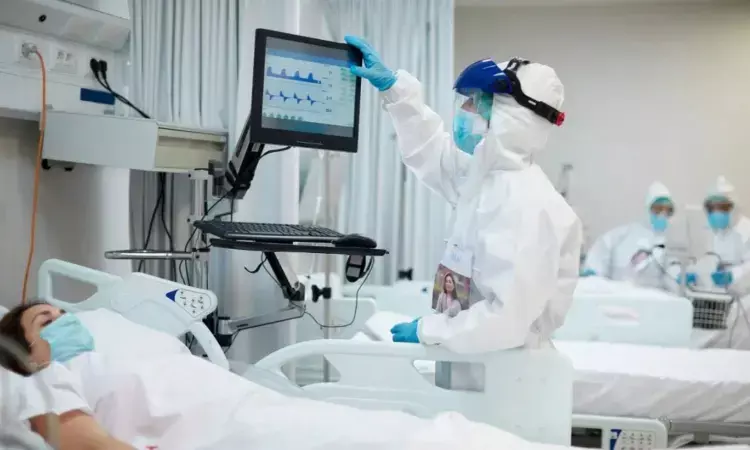- Home
- Medical news & Guidelines
- Anesthesiology
- Cardiology and CTVS
- Critical Care
- Dentistry
- Dermatology
- Diabetes and Endocrinology
- ENT
- Gastroenterology
- Medicine
- Nephrology
- Neurology
- Obstretics-Gynaecology
- Oncology
- Ophthalmology
- Orthopaedics
- Pediatrics-Neonatology
- Psychiatry
- Pulmonology
- Radiology
- Surgery
- Urology
- Laboratory Medicine
- Diet
- Nursing
- Paramedical
- Physiotherapy
- Health news
- Fact Check
- Bone Health Fact Check
- Brain Health Fact Check
- Cancer Related Fact Check
- Child Care Fact Check
- Dental and oral health fact check
- Diabetes and metabolic health fact check
- Diet and Nutrition Fact Check
- Eye and ENT Care Fact Check
- Fitness fact check
- Gut health fact check
- Heart health fact check
- Kidney health fact check
- Medical education fact check
- Men's health fact check
- Respiratory fact check
- Skin and hair care fact check
- Vaccine and Immunization fact check
- Women's health fact check
- AYUSH
- State News
- Andaman and Nicobar Islands
- Andhra Pradesh
- Arunachal Pradesh
- Assam
- Bihar
- Chandigarh
- Chattisgarh
- Dadra and Nagar Haveli
- Daman and Diu
- Delhi
- Goa
- Gujarat
- Haryana
- Himachal Pradesh
- Jammu & Kashmir
- Jharkhand
- Karnataka
- Kerala
- Ladakh
- Lakshadweep
- Madhya Pradesh
- Maharashtra
- Manipur
- Meghalaya
- Mizoram
- Nagaland
- Odisha
- Puducherry
- Punjab
- Rajasthan
- Sikkim
- Tamil Nadu
- Telangana
- Tripura
- Uttar Pradesh
- Uttrakhand
- West Bengal
- Medical Education
- Industry
Theophylline, potential drug for treating COVID-19 associated sinus bradycardia: Study

Jaipur, Rajasthan: A short course of oral etophylline and theophylline prolonged-release tablet (150 mg) could be used for treating sinus bradycardia due to COVID-19 in the future, a recent study has suggested. The findings, published in the Journal of the Association of Physicians of India (JAPI) showed that sinus bradycardia due to COVID-19 is usually transient and responds well to this drug.
The researchers further found the drug to be safer than other modalities for the treatment of sinus node dysfunction associated with COVID-19. However, they feel the need for strict monitoring and larger studies to assess the benefit-risk balance of the addition of this drug.
One of the most common arrhythmias reported with COVID-19 is sinus bradycardia. The insertion of a pacemaker becomes difficult due to the pandemic scenario and the risk of infection spread to the additional staff involved. Orciprenaline is known to the sino-atrial and atrioventricular nodes and accelerate atrioventricular conduction. In people with sinus bradycardia, theophylline improves sinus node function and enhances atrioventricular nodal conduction.
A team of Indian researchers led by Archit Dahiya, Senior Resident, Mahatma Gandhi Medical College and Hospital, Jaipur, Rajasthan, report a case series of 10 patients admitted in dedicated COVID-19 ICUs and developed sinus node dysfunction. These patients started on etophylline and theophylline prolonged-release tablet (150mg) once a day. On subsequent follow-up after 72 hours, all patients reported heart rates well within the normal range.
All the patients were aged above 40 years of age; the eldest one was 82 years (60% were females and 40% were males). Three patients were in High flow oxygen mask, six on noninvasive ventilation (NIV) support, and one was intubated and mechanically ventilated (MV). None of the patients reported syncope and presyncope was reported in 3. Two patients had past history of coronary artery disease. Case 3 underwent PTCA to LAD 8 years back. Case 8 had CABG done 6 years back. Both patients were on antiplatelets.
None of the patients were currently on calcium channel blockers, digoxin, or beta-blockers. Also, none of them had any previous history of sinus node dysfunction. All the patients were either receiving remdesivir or received during the current hospital stay. TSH levels for all the patients in this series were within the normal range.
Heart rate was reported as low as 40 whereas two patients at the time of consult were having a heart rate of 50 bpm. ECGs of all patients showed Sinus Bradycardia.
"COVID-19 virus directly involves the myocardium by entering the cardiac myocytes resulting in inflammation and injury," wrote the authors. "As the sinus bradycardia due to COVID-19 is usually transient and responds well to this drug, a short course of the drug could be added to treat this arrhythmia in future."
Reference:
Dr Kamal Kant Kohli-MBBS, DTCD- a chest specialist with more than 30 years of practice and a flair for writing clinical articles, Dr Kamal Kant Kohli joined Medical Dialogues as a Chief Editor of Medical News. Besides writing articles, as an editor, he proofreads and verifies all the medical content published on Medical Dialogues including those coming from journals, studies,medical conferences,guidelines etc. Email: drkohli@medicaldialogues.in. Contact no. 011-43720751


